in Thoreau’s Journal:
We are most apt to remember and cherish the flowers which appear earliest in the spring.

I look with equal affection on those which are the latest to bloom in the fall.

in Thoreau’s Journal:
It is so cool a morning that for the first time I move into the entry to sit in the sun. But in this cooler weather I feel as if the fruit of my summer were hardening and maturing a little, acquiring color and flavor like the corn and other fruits in the field. When the very earliest ripe grapes begin to be scented in the cool nights, then, too, the first cooler airs of autumn begin to waft my sweetness on the desert airs of summer. Now, too, poets nib their pens afresh. I scent their first-fruits in the cool evening air of the year. By the coolness the experience of the summer is condensed and matured, whether our fruits be pumpkins or grapes. Man, too, ripens with the grapes and apples.
in Thoreau’s Journal:
A new moon visible in the east. How unexpectedly it always appears! You easily lose it in the sky…..

The poet is a man who lives at last by watching his moods. An old poet comes at last to watch his moods as narrowly as a cat does a mouse.
I omit the unusual –– the hurricanes and earthquakes –– and describe the common. This has the greatest charm and is the true theme of poetry. You may have the extraordinary for your province, if you will let me have the ordinary.

in Thoreau’s Journal:
Would it not be well to describe some of those rough—all day walks across lots….

—-Picking our way over quaking meadows & swamps —& occasionally slipping into the muddy batter mid-leg deep—-jumping or fording ditches & brooks—forcing our way through dense blueberry swamps—-where there is water beneath & bushes above—then brushing through extensive birch forests all covered with green lice—which cover our clothes & face—then under larger wood relieved, more open beneath—-steering for some more conspicuous trunk Now along a rocky hill side where the sweet fern grows for a mile—then over a recent cutting—finding our uncertain footing on the cracking tops & trimmings of trees left by the choppers— Now taking a step or 2 of smooth walking across a high way— Now through a dense pine wood descending—into a rank dry swamp where the cinnamon fern rises above your head—with isles of poison dog wood— Now up a scraggy hill—covered with shrub oak—stooping & winding ones way—for half a mile—tearing ones clothes in many places & putting out ones eyes—& find at last that it has no bare brow but another slope of the same character— Now through a corn field diagonally with the rows—now coming upon the hidden melon patch seeing the back-side of familiar hills & not knowing them. The nearest house to home which you do not know—seeming further off—than the farthest which you do know— In the spring defiled with the froth on various bushes, &c &c &c— Now reaching on higher land some open—pigeon place—a breathing place for us.
in Thoreau’s Journal:
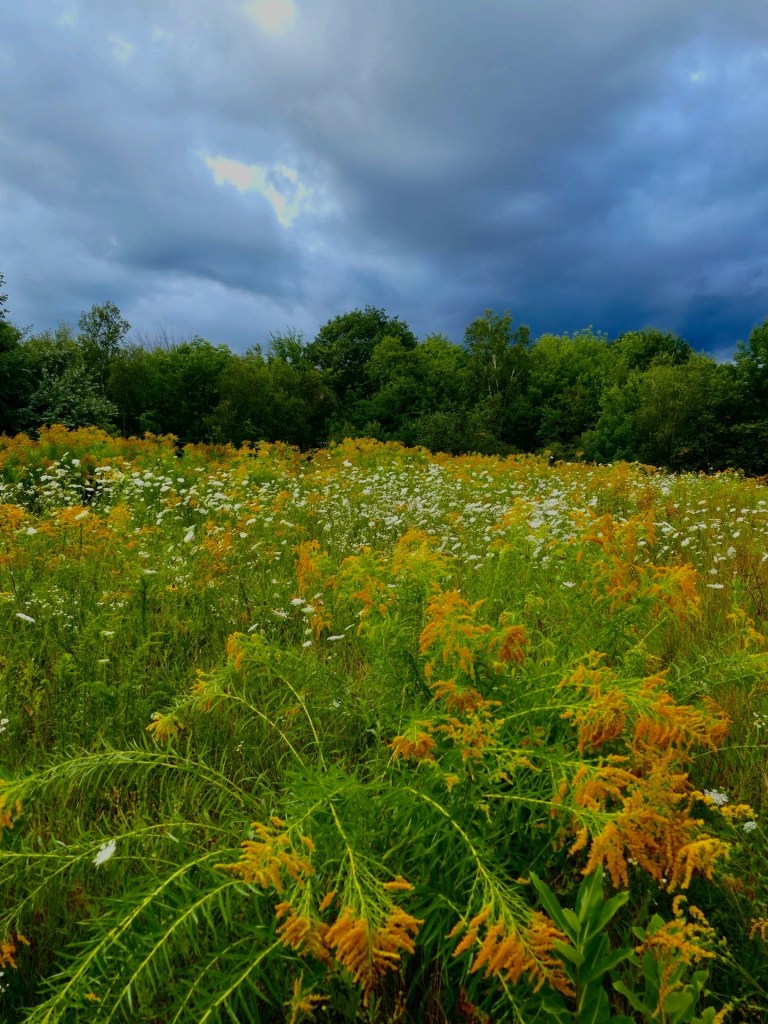
Methinks the truly weather-wise will know themselves––& find the signs of rain in their own moods––the aspect of their own skies or thoughts & not consult swallows & spiders–– I incline always questions about the weather without thinking. Does a mind in sympathy with nature need a hygrometer?
in Thoreau’s Journal:
The interregnum in the blossoming of flowers being well over, many small flowers blossom now in the low grounds, having just reached their summer. It is now dry enough, and they feel the heat their tenderness required.
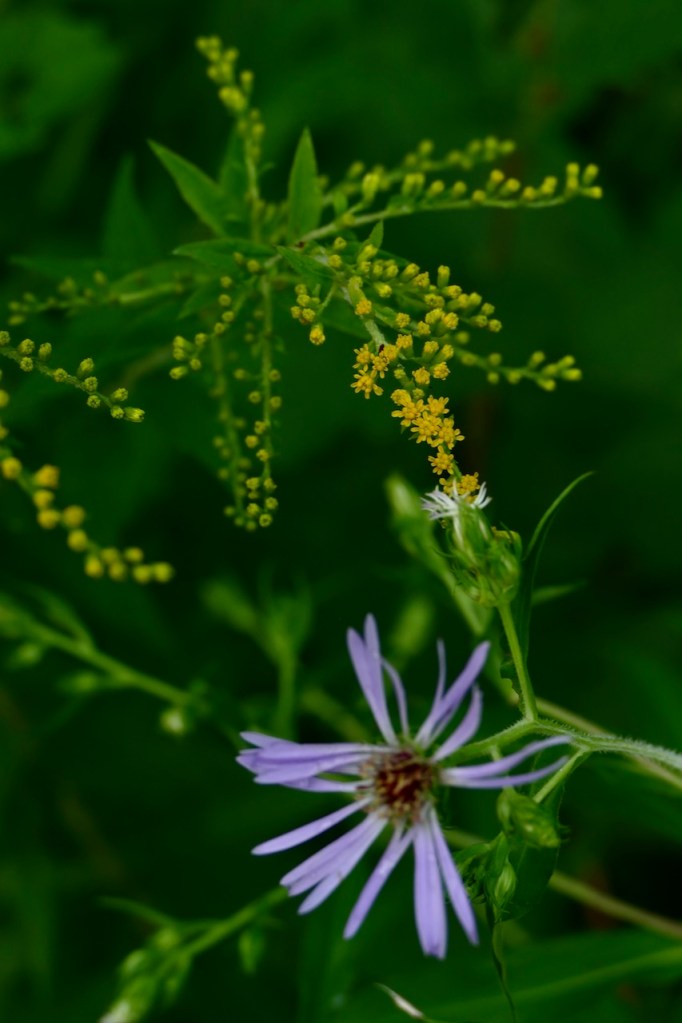
The autumnal flowers, and johnswort, goldenrods, asters, though they have made demonstrations, have not yet commenced to reign.
in Thoreau’s Journal:
A still afternoon with a prospect of a shower in the west. The immediate edge of the river is for the most part respected by the mowers, and many wild plants there escape from year to year, being too coarse for hay. The prevailing flowers now along the river are the mikania, polygonums, trumpet-weed, cardinal, arrow- head, Chelone glabra [white turtlehead] and here and there vernonia. The button-bush is out of bloom and its balls browning. On the steep hillside where the Leaning Hemlocks grow slanted over the river and from year to year falling into it, I am surprised to see that many are leaning and falling up the hill, owing to a slide which has carried their roots forward toward the water. I hear the muttering of thunder and the first drops dimple the river.

in Thoreau’s Journal:
There is some advantage, intellectually and spiritually, in taking wide views with the bodily eye and not pursing an occupation which holds the body prone. There is some advantage, perhaps, in attending to the general features of the landscape over studying the particular plants and animals which inhabit it.
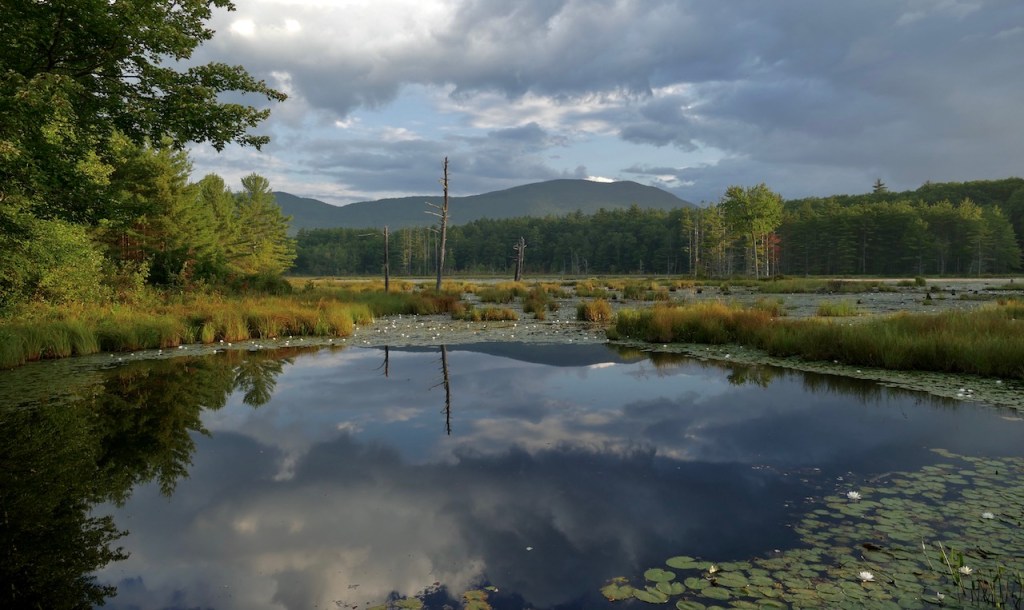
A man may walk abroad and no more see the sky than if he walked under a shed. The poet is more in the air than the naturalist, though they may walk side by side. Granted that you are out-of-doors; but what if the outer door is open, if the inner door is shut! You must walk perfectly free, not prying nor inquisitive, not bent upon seeing things. Throw away a whole day for a single expansion, a single inspiration of air.
in Thoreau’s Journal:
How copious and precise the botanical language to describe the leaves, as well as the other parts of a plant! Botany is worth studying if only for the precision of its terms, —to learn the value of words and of system. It is wonderful how much pains has been taken to describe a flower’s leaf, compared for instance with the care that is taken in describing a psychological fact. Suppose as much ingenuity (perhaps it would be needless) in making a language to express the sentiments ! We are armed with language adequate to describe each leaf in the field, or at least to distinguish it from each other, but not to describe a human character. With equally wonderful indistinctness and confusion we describe men. The precision and copiousness of botanical language applied to the description of moral qualities!
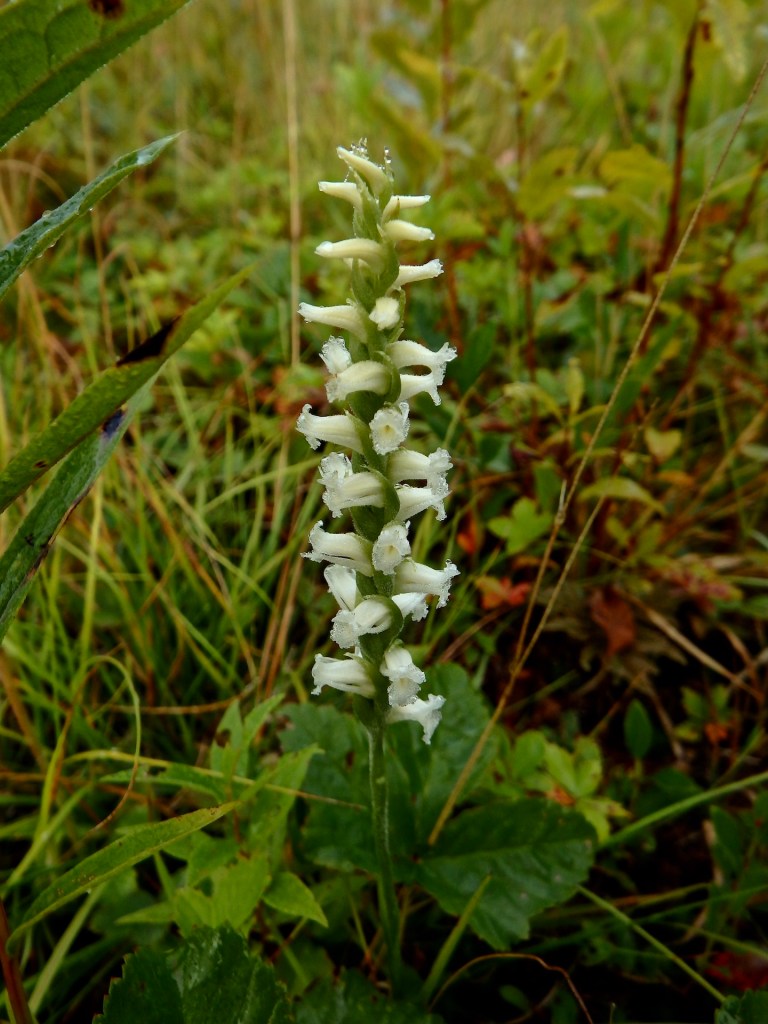
The neottia or ladies tresses behind Garfield’s house.
in Thoreau’s Journal:
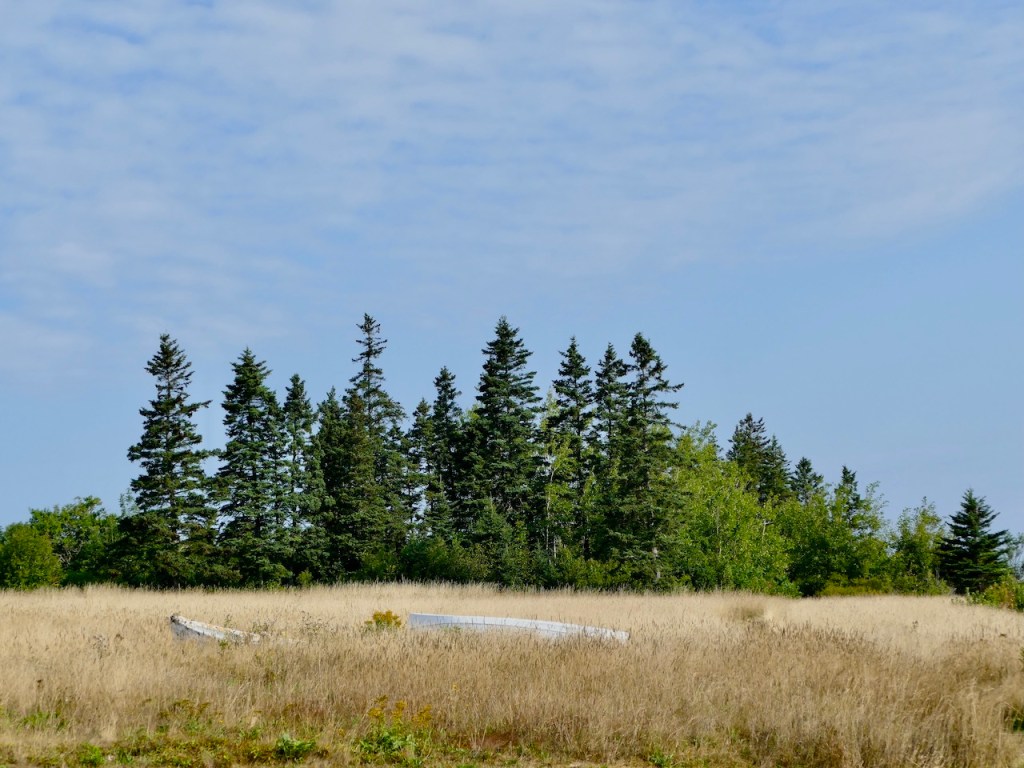
The grass in the high pastures is almost as dry as hay –– The seasons do not cease a moment to revolve, and therefore Nature rests no longer at her culminating point than at any other. If you are not out at the right instant, the summer may go by & you not see it. How much of the year is spring & fall! How little can be called summer! The grass is no sooner grown than it begins to wither.
in Thoreau’s Journal:
What means this sense of lateness that so comes over one now––as if the rest of the year were down hill & we had not performed anything before––we should not now–– The season of flowers or of promise may be said to be over & now is the season of fruits; but where is our fruit? The night of the year is approaching, what have we done with our talent?

All nature prompts & reproves us–– How early in the year it begins to be late. The sound of the crickets even in the spring makes our hearts beat with its aweful reproof––while it encourages with its seasonable warning. It matters not by how little we have fallen behind––it seems irretrievably late. The year is full of warnings of its shortness––as is life–– The sound of so many insects & the sight of so many flowers affect us so–– The creak of the cricket & the sight of the Prunella & Autumnal dandelion. They say––for the night cometh in which no man may work.
in Thoreaus Journal:
These are locust days. I hear them on the elms in the street—but cannot tell where they are—loud is their song—drowning many others—but men appear not to distinguish it—though it pervade their ears as the dust their eyes.
The river was exceedingly fair this afternoon—and there are few handsomer reaches than that by the leaning oak—the deep place, where the willows make a perfect shore…
I must look for the Rudbeckia which Bradford says he found yesterday behind Joe Clarks.
in Thoreau’s Journal:
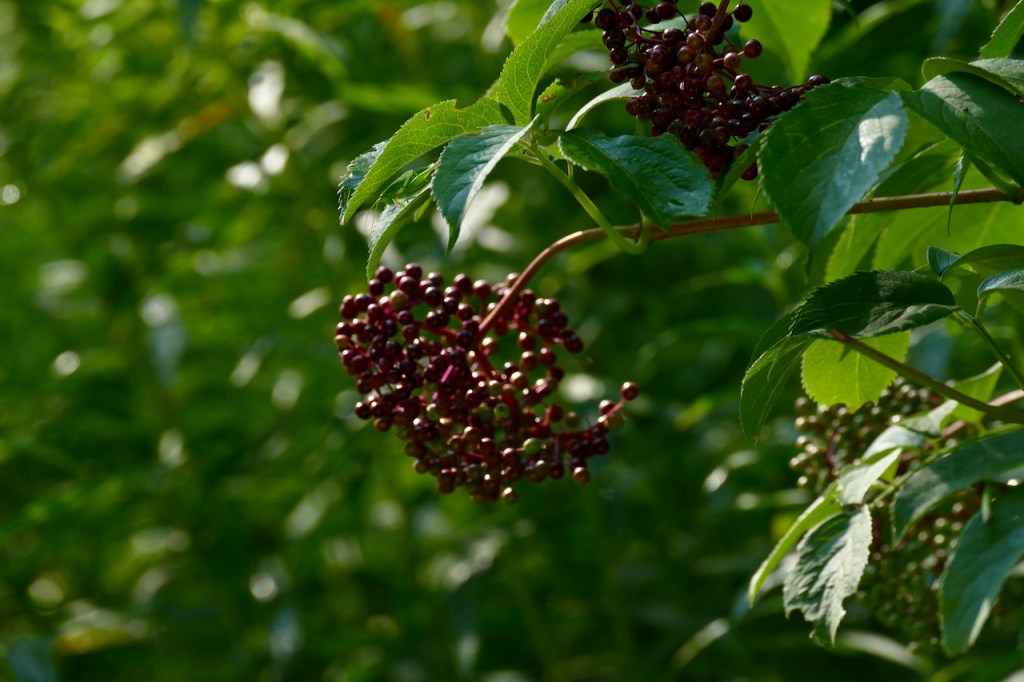
Elder-berry ripe. The river was lowest early in July. Some time past I have noticed meadow-grass floating on the river, reminding me that they were getting the hay up the stream. Some naked viburnum berries are quite dark purple amid the red, while other bunches are wholly green yet. The red choke-berry is small and green still. I plainly distinguish it, also, by its woolly under side. In E. Hubbard’s swamp I gather some large and juicy and agreeable rum cherries. The birds make much account of them. They are much finer than the small ones on large trees; quite a good fruit. Some cranberries turned red on one cheek along the edges of the meadows. Now a sudden gust of wind blows from the northwest, cooled by a storm there, blowing the dust from roads far over the fields. The whole air, indeed, is suddenly filled with dust, and the outlines of the clouds are concealed. But it proves only the wind of the ball, which apparently passes north of us. That clear ring like an alder locust (is it a cricket ?) for some time past is a sound which belongs to the season, —autumnal. Here is a second crop of clover almost as red as the first. The swamp blackberry begins. Saw a blue heron on the meadow. Aster amplexicaulis of Bigelow, apparently; probably for a day or two. An orchis by the brook under the Cliffs with only three white flowers, only smaller than the fringed white; spurs half an inch long. May it be another species?
in Thoreau’s Journal:
First marked dog-day; sultry and with misty clouds. For ten days or so we have had comparatively cool, fall-like weather.
I remember only with a pang the past spring and summer thus far. I have not been an early riser. Society seems to have invaded and overrun me. I have drank tea and coffee and made myself cheap and vulgar. My days have been all noontides, without sacred mornings and evenings. I desire to rise early henceforth, to associate with those whose influence is elevating, to have such dreams and waking thoughts that my diet may not be indifferent to me.
in Thoreau’s Journal:
Tuesday. 1.30 a. m. —Full moon. Arose and went to the river and bathed, stepping very carefully not to disturb the household, and still carefully in the street not to disturb the neighbors. I did not walk naturally and freely till I had got over the wall. Then to Hubbard’s Bridge at 2 a. m. There was a whip-poor-will in the road just beyond Goodwin’s, which flew up and lighted on the fence and kept alighting on the fence within a rod of me and circling round me with a slight squeak as if inquisitive about me. I do not remember what I observed or thought in coming hither.
The traveller’s whole employment is to calculate what cloud will obscure the moon and what she will triumph over. In the after-midnight hours the traveller’s sole companion is the moon. All his thoughts are centred in her. She is waging continual war with the clouds in his behalf. What cloud will enter the lists with her next, this employs his thoughts; and when she enters on a clear field of great extent in the heavens, and shines unobstructedly, he is glad. And when she has fought her way through all the squadrons of her foes, and rides majestic in a clear sky, he cheerfully and confidently pursues his way, and rejoices in his heart. But if he sees that she has many new clouds to contend with, he pursues his way moodily, as one disappointed and aggrieved he resents it as an injury to himself. It is his employment to watch the moon, the companion and guide of his journey, wading through clouds, and calculate what one is destined to shut out her cheering light. He traces her course, now almost completely obscured, through the ranks of her foes, and calculates where she will issue from them. He is disappointed and saddened when he sees that she has many clouds to contend with.
Sitting on the sleepers of Hubbard’s Bridge, which is being repaired, now, 3 o’clock a. m., I hear a cock crow. How admirably adapted to the dawn is that sound! as if made by the first rays of light rending the darkness, the creaking of the sun’s axle heard already over the eastern hills.
Though man’s life is trivial and handselled, Nature is holy and heroic. With what infinite faith and promise and moderation begins each new day! It is only a little after 3 o’clock, and already there is evidence of morning in the sky.
He rejoices when the moon comes forth from the squadrons of the clouds unscathed and there are no more any obstructions in her path, and the cricket also seems to express joy in his song. It does not concern men who are asleep in their beds, but it is very important to the traveller, whether the moon shines bright and unobstructed or is obscured by clouds. It is not easy to realize the serene joy of all the earth when the moon commences to shine unobstructedly, unless you have often been a traveller by night.
The traveller also resents it if the wind rises and rustles the leaves or ripples the water and increases the coolness at such an hour.
A solitary horse in his pasture was scared by the sudden sight of me, an apparition to him, standing still in the moonlight, and moved about, inspecting with alarm, but I spoke and he heard the sound of my voice; he was at once reassured and expressed his pleasure by wagging his stump of a tail, though still half a dozen rods off. How wholesome the taste of huckleberries, when now by moonlight I feel for them amid the bushes!
And now the first signs of morning attract the traveller’s attention, and he cannot help rejoicing, and the moon begins gradually to fade from his recollection. The wind rises and rustles the copses. The sand is cool on the surface but warm two or three inches beneath, and the rocks are quite warm to the hand, so that he sits on them or leans against them for warmth, though indeed it is not cold elsewhere. As I walk along the side of Fair Haven Hill, I see a ripple on the river, and now the moon has gone behind a large and black mass of clouds, and I realize that I may not see her again in her glory this night, that perchance ere she rises from this obscurity, the sun will have risen, and she will appear but as a cloud herself, and sink unnoticed into the west (being a little after full (a day ?)). As yet no sounds of awakening men; only the more frequent crowing of cocks, still standing on their perches in the barns. The milkmen are the earliest risers, though I see no lanterns carried to their barns in the distance, —preparing to carry the milk of cows in their tin cans for men’s breakfasts, even for those who dwell in distant cities. In the twilight now, by the light of the stars alone, the moon being concealed, they are pressing the bounteous streams from full udders into their milk-pails, and the sound of the streaming milk is all that breaks the sacred stillness of the dawn; distributing their milk to such as have no cows. I perceive no mosquitoes now. Are they vespertinal, like the singing of the whip-poor-will? I see the light of the obscured moon reflected from the river brightly. With what mild emphasis Nature marks the spot! —so bright and serene a sheen that does not more contrast with the night.

4 A. M. —It adds a charm, a dignity, a glory, to the earth to see the light of the moon reflected from her streams. There are but us three, the moon, the earth which wears this jewel (the moon’s reflection) in her crown, and myself. Now there has come round the Cliff (on which I sit), which faces the west, all unobserved and mingled with the dusky sky of night, a lighter and more ethereal living blue, whispering of the sun still far, far away, behind the horizon. From the summit of our atmosphere, perchance, he may already be seen by soaring spirits that inhabit those thin upper regions, and they communicate the glorious intelligence to us lower ones. There real divine, the heavenly, blue, the Jove-containing air, it is, I see through this dusky lower stratum. The sun gilding the summits of the air. The broad artery of light flows overall the sky. Yet not without sadness and compassion I reflect that I shall not see the moon again in her glory. (Not far from four, still in the night, I heard a nighthawk squeak and boom, high in the air, as I sat on the Cliff. What is said about this being less of a night bird than the whip-poor-will is perhaps to be questioned. For neither do I remember to have heard the whip-poor-will sing at 12 o’clock, though I met one sitting and flying between two and three this morning. I believe that both may be heard at midnight, though very rarely.) Now at very earliest dawn the nighthawk booms and the whip-poor-will sings. Returning down the hill by the path to where the woods [are] cut off, I see the signs of the day, the morning red. There is the lurid morning star, soon to be blotted out by a cloud.
There is an early redness in the east which I was not prepared for, changing to amber or saffron, with clouds beneath in the horizon and also above this clear streak.
The birds utter a few languid and yawning notes, as if they had not left their perches, so sensible to light to wake so soon, —a faint peeping sound from I know not what kind, a slight, innocent, half-awake sound, like the sounds which a quiet housewife makes in the earliest dawn. Nature preserves her innocence like a beautiful child. I hear a wood thrush even now, long before sunrise, as in the heat of the day. And the pewee and the catbird and the vireo, red-eyed? I do not hear —or do not mind, perchance—the crickets now. Now whip-poor-wills commence to sing in earnest, considerably after the wood thrush. The wood thrush, that beautiful singer, inviting the day once more to enter his pine woods. (So you may hear the wood thrush and whip-poor-will at the same time.) Now go by two whip-poor-wills, in haste seeking some coverts from the eye of day. And the bats are flying about on the edge of the wood, improving the last moments of their day in catching insects. The moon appears at length, not yet as a cloud, but with a frozen light, ominous of her fate. The early cars sound like a wind in the woods. The chewinks make a business now of waking each other up with their low yorrick in the neighboring low copse. The sun would have shown before but for the cloud. Now, on his rising, not the clear sky, but the cheeks of the clouds high and wide, are tinged with red, which, like the sky before, turns gradually to saffron and then to the white light of day.

The nettle-leaved vervain (Verbena urticifolia) by roadside at Emerson’s. What we have called hemp answers best to Urtica dioica, large stinging nettle? Now the great sunflower’s golden disk is seen.
The days for some time have been sensibly shorter; there is time for music in the evening.
I see polygonums in blossom by roadside, white and red.
A eupatorium from Hubbard’s Bridge causeway answers to E. purpureum, except in these doubtful points, that the former has four leaves in a whorl, is unequally serrate, the stem is nearly filled with a thin pith, the corymb is not merely terminal, florets eight and nine. Differs from verticillatum in the stem being not solid, and I perceive no difference between calyx and corolla in color, if I know what the two are. It may be one of the intermediate varieties referred to.
You must be logged in to post a comment.